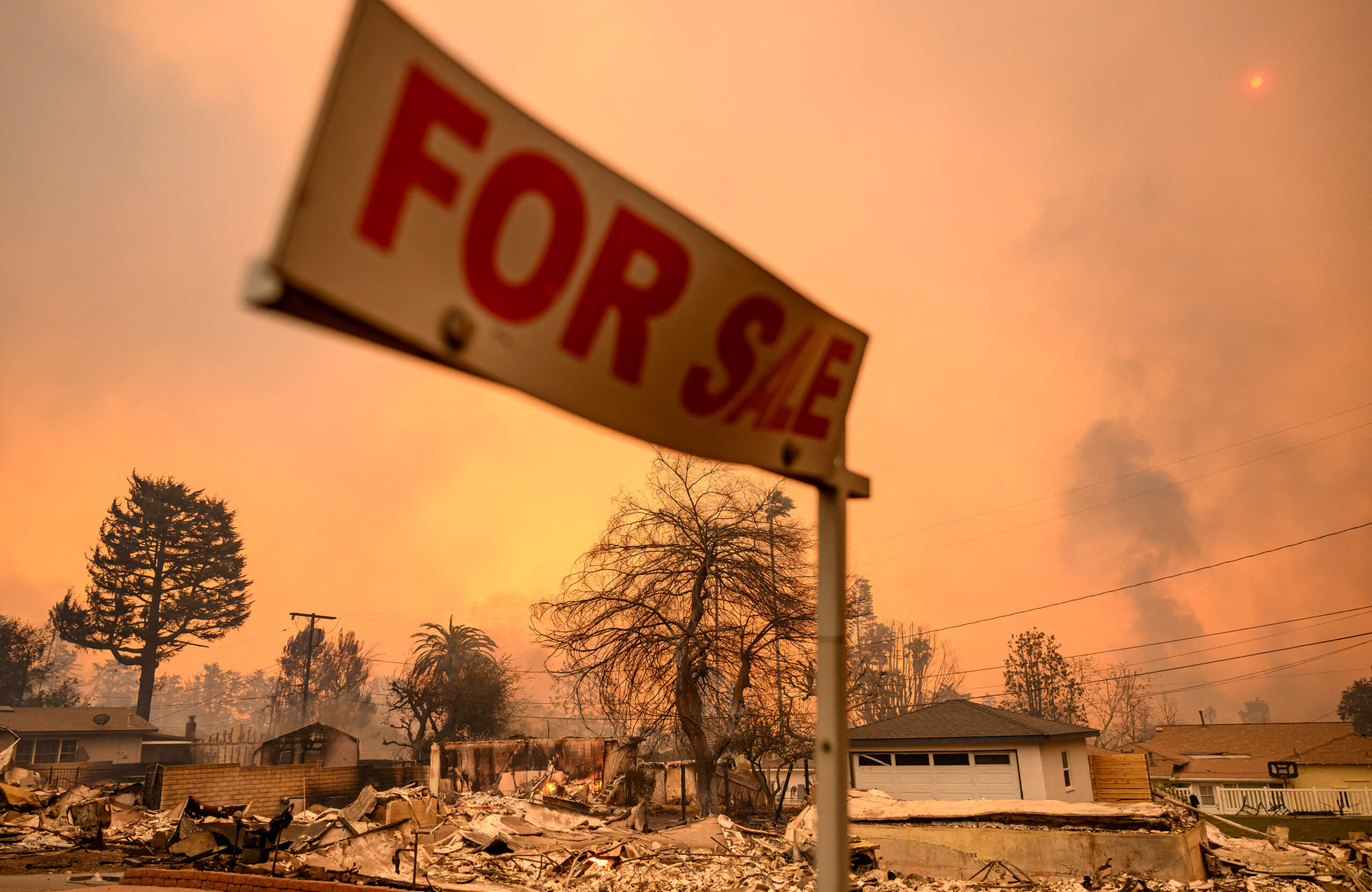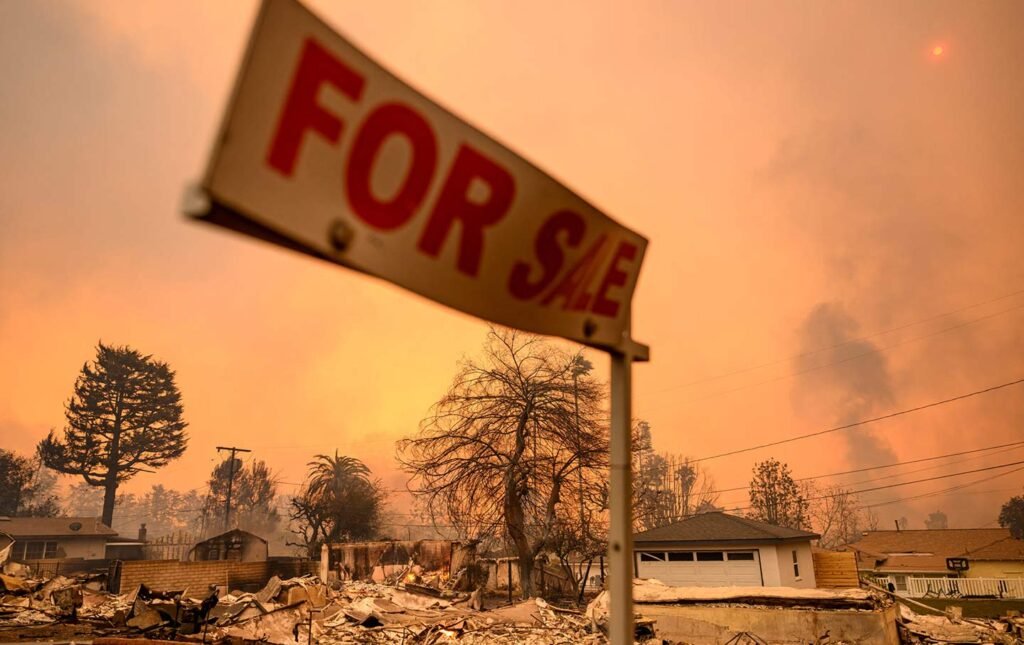The relentless evolution of eviction procedures isn’t just a grim irony in the face of sudden displacement just miles away—it’s also a harbinger of the city’s future.

A for sale sign remains as homes smolder during the Eaton Fire in the Altadena neighborhood of Los Angeles County, California on January 8, 2025.
(Josh Edelson/AFP/Getty Images)
Lassistant Aangeles SCalifornia— Altadena and Pacific Palisades were reduced to embers last Tuesday morning, the fires that consumed them both still raging, new blazes erupted in Ventura County, Santa Ana winds picked up again — and on the sixth floor of the Stanley Mosco Courthouse in downtown Los – Angeles, dozens of people lost their homes for completely unrelated reasons.
The historic fires destroyed thousands of buildings and disrupted many aspects of normal life in Los Angeles County, but that didn’t stop the daily grind of evictions. Several meetings were postponed, but for 10 in the morningjust days after the peak of the fire, which forced 100,000 people to flee their neighborhoods, the corridors of the sixth floor were full of bailiffs, lawyers in suits rattling their phones, tenants wearily waiting their turn before the judge. . A little boy in “Lilo & Stitch” pajamas walked back and forth down the hall hand in hand with his mom. “Welcome to Hell,” Rose, an organizer with the Los Angeles Tenants Union (LATU), greeted me.
I walked into courtroom 93, where a tall, slender man named Jesse Stephen Aguirre explained to the judge what the home he had lived in since birth meant to him and his family. “In 1990, I would have been 6 years old,” he began, speaking so quietly that it was hard to hear him from the back of the room. “We recently found a picture of me, Jesse Steven Aguirre, and my mother, Miriam Manares Reyes, sitting on the front steps of the back house on… Drive, which has been our rental home ever since…” The judge cut him off. to return to the procedural dispute: whether the family received the motion filed by the other party’s attorney.
Aguirre never got around to reading the rest of his statement. Outside the courtroom after the hearing, he explained to me that his landlord began trying to evict him and his family shortly after his grandmother, the original tenant, died last March. Glassell Park, a hilly neighborhood in northeast Los Angeles, was rough when the family first moved in in 1984. Now there were wine bars and breakfast spots, and the family knew their landlord could get more than three times what they were paying for in the current market – as long as he pulled them out first. Aguirre showed me an envelope containing a check for $9,018: the full amount the family owed in rent. The owner, he told me, refused to accept payment for several months to pursue delinquency, a common practice for landlords looking to get rid of tenants. “He didn’t want our money anymore,” said Miriam, Aguirre’s mother. “No explanation, no reason.”
Like most tenants in eviction court, the family lacks an attorney. This is a civil process, so tenants are not entitled to it. Aguirre was going instead for myselfarmed only with a large binder full of case documents he collected with the help of the Eviction Defense Network. The lawyers of the organization sat on a bench near the elevators, consulted with the tenants about their cases and tried to prepare them for their appearance in court. “Suffering happens every day… but now it’s affecting another sector of our society,” one lawyer told me. After the fires, she reasoned, even Angelenos who had never before feared losing their home might “understand what’s going on in the city, and how hard it is to find a place, and how unaffordable and precarious it is to stay in Los Angeles. »
The devastation of the Palisades and Eaton fires is hard to imagine, with about 10,000 homes destroyed in one night. Moving people in eviction court can seem like a routine matter. It happens gradually: a notice, a failure to appear in court, a pile of documents you can’t understand, your belongings piled up on the curb. None of this is particularly dramatic. If you weren’t on the sixth floor of Stanley Mosk, you probably wouldn’t even know it was happening. And yet it happens all the time, year-round, without anyone paying attention: Los Angeles has between 4,500 and 5,000 official evictions per month, or more than 150 every day. Meanwhile, data from the American housing survey shows that for every official relocation in Los Angeles, there are nearly six “forced evictions,” a category that includes both people uprooted by those fires and many other tenants forced out of their homes without due process.
The inexorable, mechanical progression of the eviction procedure isn’t just a grim irony amid so many sudden and horrific displacements just miles away—it’s also a harbinger of Los Angeles’ future after this disaster. The debris caused by the wildfires is sure to activate the standard foreclosure cycle: countless residences have been written off the map, and for many property owners this sudden surge in demand has presented an attractive opportunity. “Many tenants were affected. My supervisor, she lost everything,” Heidi, a LATU organizer, told me. “Now she is trying to get (new) housing. But the fact is that the price has increased.”
New Los Angeles District Attorney Nathan Hochman holds press conference to announce fees against looters, hotels and landlords raise their rates. A friend who was moving out of her Culver City apartment last weekend asked her landlord if the fires had hurt her ability to show the property to prospective tenants. “No! It actually was big for us!” – beaming, answered the woman.
A fire may be an insurer’s nightmare, but it’s a developer’s dream. Although it received less national press than the leveling of the Palisades, the destruction of Altadena, a thriving, historically black community in the foothills of the Angeles National Forest, is no less absolute. As families struggle to cover temporary housing costs along with ongoing mortgage obligations, developers are already swooping in to try to buy up the land: a classic case of disaster capitalism that reminded one resident of his grandmother’s relocation during Hurricane Katrina. They will be assisted in their search by Governor Newsom almost wholesale cancellation California Environmental Quality Act for Buildings Destroyed by Fires.
Meanwhile, expensive houses require a sustainable labor contribution— gardeners, housekeepers, maintenance workers — and the loss of the Palisades means a loss of livelihood for many working people, many of whom commuted to the neighborhood from South or East Los Angeles. Fires also destroyed businesses, leaving their workers behind sad and worried about next month’s rent.
That same morning, meetings of the Los Angeles City Council and the County Board of Supervisors were held a few blocks from the courthouse. Angelenos spoke out and made calls calling on both governing bodies to impose an eviction moratorium, establish renter protections and enforce laws aimed at preventing price gouging during the disaster. Without those safeguards, more people are likely to miss the down payment, starting a process that could end up with them joining the already large ranks of Los Angeles’ homeless population: another disaster unfolding in slow motion. Unlike the wildfires that sweep through Southern California’s dry hills like clockwork every year, none of this was inevitable.


